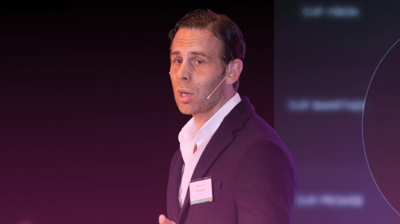With data privacy regulations such as the GDPR and CCPA, many organizations are rethinking their social media strategies, especially when it comes to talent attraction. In addition, the restrictions on tracking have put a further damper on recruitment advertising, making it more difficult to engage with potential hires on social media. So how can Talent and HR leaders adjust their strategies to make sure they are still reaching the right candidates? Let’s look at some best practices for engaging talent on social media in the era of data privacy.
Showcase Quality Content
Quality content will help you attract passive candidates who are not actively searching for jobs but may be interested in your company if they see something that piques their interest.
The key to success is creating content that stands out from the crowd, appeals to your target audience but also reinforces a positive brand image for those who you don’t want to apply. You know you need to present the best possible image, but you should also ensure that there is authenticity in the stories you share.
You need to make sure your content reflects all aspects of your brand and resonates with potential hires, so make sure you know your talent audience. This can mean anything from sharing stories about current employees or showcasing company initiatives that demonstrate your commitment to diversity and inclusion.
Automate for Success
You will already know that automation can help enormously by streamlining the recruitment process and making it, and therefore you, more efficient. Automation can provide targeted talent attraction through social media, email campaigns, and targeted advertising.
The benefits from augmenting don’t stop there - automated recruitment software can also identify qualified candidates faster than manual methods, improve recruitment analytics to track recruitment success, and reduce time-consuming recruitment tasks such as manually sending out emails or scheduling interviews. Ultimately, recruitment marketing automation helps save time and resources while still delivering a quality recruitment experience.
Nurture Early
Once you have engaged potential candidates with quality content, reach out directly via private messaging or email to start a dialogue with them. Keep your messages short, sweet, and informative – don’t just send out generic job descriptions but rather explain why you think this person would be suitable for the role and why working at your company would be an ideal opportunity for them. This personal touch will go a long way towards helping you connect with top-tier talent.
Leverage Employee Advocacy
Your current employees are one of your most valuable assets when it comes to recruitment efforts. Encourage them to share posts about their work experience, career opportunities at the company, or even just funny stories about working there – all these things will help you build relationships with potential hires and increase visibility for your brand.
Summary
Recruiting in an age of data privacy doesn’t need to be complicated – by focusing on quality content, automating, nurturing, and leveraging employee advocacy tools, Talent and HR leaders can create effective social media strategies that help them engage top-tier talent and build relationships with prospective hires in a fully compliant manner. With these tips in hand, you should be well-equipped to adapt your recruitment strategy, so it is ready for the new rules of engagement imposed by data privacy regulations worldwide!
****
FAQs
-
What is recruitment marketing?
Recruitment marketing is the process of connecting with potential job seekers and attracting them to your company. This involves leveraging a combination of social media, digital channels and traditional recruitment mediums like job boards or recruitment agencies to gain attention for your employer brand story.
-
How can social media help attract talent?
Social media provides an effective platform to share your employer branding message, engage prospective candidates and build relationships with them. It's also a great way to showcase your job openings while highlighting the core values, workplace culture and achievements of your company that can make it stand out from the competition as well as an attractive destination for top talent.
-
What are some best practices when it comes to recruitment marketing?
Best practices for recruitment marketing involve creating compelling content on social media that accurately represents your employer brand story to capture the attention of potential candidates. You should also focus on building relationships by replying promptly and engaging in meaningful conversations with job seekers online. Additionally, leveraging relevant data analytics can inform decisions about which platforms work best for driving engagement to refine recruitment efforts over time.
-
How can you navigate and respect data privacy, whilst attracting the best and most relevant talent over social media?
When recruiting via social media, be sure to use best practices when it comes to data privacy. Make sure recruitment messaging is compliant with emerging laws, like GDPR and CCPA. Don’t harvest personal information without permission from potential candidates. If you need further guidance on recruitment regulation compliance for your country or state, seek out an experienced HR professional or legal adviser in recruitment law.
-
What are the latest changes to tracking and data privacy that the major social channels are implementing this year?
In 2021, most major social media platforms have implemented new guidelines surrounding the use of tracking technologies such as cookies in recruitment marketing efforts. For example, Facebook has put forth a policy requiring employers to obtain explicit consent before using pixel tags on their recruitment websites or job postings. Similarly, platforms like Twitter are now prohibiting employers from collecting certain types of personal data through their recruitment efforts if they don’t have explicit consent first. It’s important to stay up to date with any relevant regulations your business must abide by when recruiting through these channels so that you do not get penalized.
****
6 Steps for Effective Engagement Over Social
- Analyze your target audience: Identify the talent audience that you want to attract to your business and what kind of messages would resonate with them.
- Identify suitable channels: Explore social media platforms where your target audience is active and decide on which ones you should focus your efforts on.
- Establish a content strategy: Create engaging content across all social media channels that highlight the best aspects of working at your business, such as values, culture, benefits, career opportunities etc.
- Monitor results and adjust accordingly: Track metrics such as impressions, followers/likes to measure success; adjust or optimize content, if necessary, with this feedback in mind.
- Engage audiences through conversations: Make sure to interact with potential candidates by responding to their questions or comments either publicly or privately; build relationships by conversing about relevant topics related to recruitment and talent attraction over social media networks.
- Measure recruitment performance from engagement rates: Track the number of hires resulting from engagement via social channels and track the candidate experience to see where you can improve.










